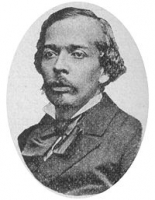| José-Maria de Heredia | |||||
| 若瑟-马里亚·德·埃雷迪亚 | |||||
Read works of José Maria de Heredia at 诗海 | |||||
At the age of eight he came from the West Indies to France, returning thence to Havana at seventeen, and finally making France his home not long afterwards. He received his classical education with the priests of Saint Vincent at Senlis, and after a visit to Havana he studied at the Ecole des Chartes at Paris. In the later 1860s, with François Coppée, Sully-Prudhomme, Paul Verlaine and others less distinguished, he made one of the bands of poets who gathered round Leconte de Lisle, and received the name of Parnassiens.
To this new school, form - the technical side of their art - was of supreme importance, and, in reaction against the influence of Musset, they rigorously repressed in their work the expression of personal feeling and emotion. "True poetry," said M. de Heredia in his discourse on entering the Academy - "true poetry dwells in nature and in humanity, which are eternal, and not in the heart of the creature of a day, however great." M. de Heredia's place in the movement was soon assured. He wrote very little, and published even less, but his sonnets circulated in manuscript, and gave him a reputation before they appeared in 1893, together with a few longer poems, as a volume, under the title of Les Trophées.
He was elected to the Académie française on February 22, 1894, in the place of Louis de Mazade-Percin the publicist. Few purely literary men can have entered the Academy with credentials so small in quantity. A small volume of verse - a translation, with introduction, of Diaz del Castillo's History of the Conquest of New Spain (1878-1881) - a translation of the life of the nun Alferez (1894), de Quincey's "Spanish Military Nun" - and one or two short pieces of occasional verse, and an introduction or so - this is but small literary baggage, to use the French expression. But the sonnets are of their kind among the most superb in modern literature. "A Légende des siècles in sonnets" M. François Coppée called them. Each presents a picture, striking, brilliant, drawn with unfaltering hand - the picture of some characteristic scene in man's long history. The verse is flawless, polished like a gem; and its sound has distinction and fine harmony. If one may suggest a fault, it is that each picture is sometimes too much of a picture only, and that the poetical line, like that of M. de Heredia's master, Leconte de Lisle himself, is occasionally overcrowded. M. de Heredia was nonetheless one of the most skilful craftsmen who ever practised the art of verse. In 1901 he became librarian of the Bibliothèque de l'Arsenal at Paris. He died at the Château de Bourdonné (Seine-et-Oise) on the 3rd of October 1905, having completed his critical edition of André Chénier's works.
References
This article incorporates text from the Encyclopædia Britannica Eleventh Edition, a publication now in the public domain.
